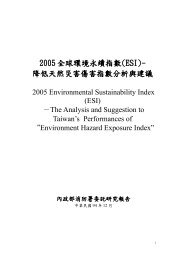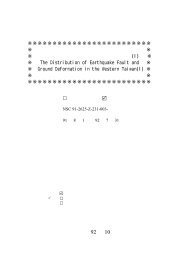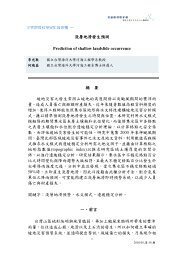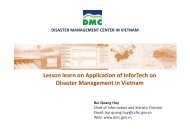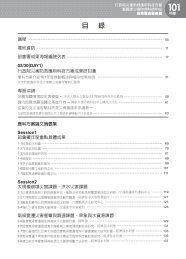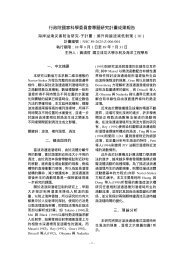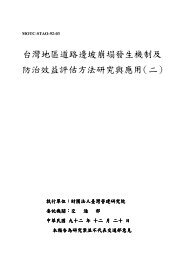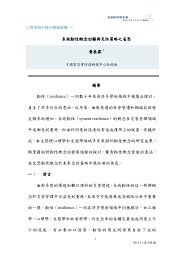行政院國家科學委員會補助專題研究計畫成果報告 - 國家災害防救科技 ...
行政院國家科學委員會補助專題研究計畫成果報告 - 國家災害防救科技 ...
行政院國家科學委員會補助專題研究計畫成果報告 - 國家災害防救科技 ...
You also want an ePaper? Increase the reach of your titles
YUMPU automatically turns print PDFs into web optimized ePapers that Google loves.
Posttraumatic cultural-transformation and meaning-making: A longitudinal<br />
study of the 921 earthquake victims’ psycho-social reconstruction processes (Ⅰ)<br />
The calamitous “921” earthquake was an important major event in<br />
Taiwan, it entailed long-term systematic research for the improvement of<br />
life quality of the survivors. This longitudinal study was based upon the<br />
multiple research paradigms, including participation observation, depth<br />
interview, and interpretive interactionism, and aimed to explore the dynamic<br />
processes of psychopathological depth and psychological growth of the<br />
victims from the developmental-constructivist view. Subjects are divided<br />
into four groups in light of their situation of life threat and experience<br />
disruption. Twenty-one cases were interviewed for at least one session at a<br />
certain disastrous site of central Taiwan from August 2001 to June 2002.<br />
As the discursive data showed, the basic structures of the psychosocial<br />
experiences of the survivors are ‘the confrontation of suffering’, ‘the<br />
identity of selfhood’, ‘the transformation of home’ and ‘the reconstruction<br />
of life-world. Further, the survivors faced the realities nothing would be “as<br />
before” after going through the disastrous event. But they struggled to<br />
accomplish ex-life tasks on the one hand, and they grieved over the dead in<br />
the light of different relationships (e.g. spouse, offspring, sidling, friend)<br />
and expressed different emotions (e.g. anger, remorse, quilt, hate) on the<br />
other hand. The bereaved family suffered with broken bonds than broken<br />
hearts. Meanwhile, the meaning of home was transformed beyond the<br />
concrete and territorial space, but as the Heideggerian ‘homely’ lived space<br />
of the ontological security. How to create and maintain the function and<br />
cohesion and support of the reconstructed home was a vital task during the<br />
posttraumatic periods.<br />
To sum up, the global outcomes of the study were analyzed through the<br />
concept of the ‘double bind’ borrowed from G. Bateson and from the<br />
narrative. Inferred from the research of the first year project, we found the<br />
trauma is a repeated suffering of the event, but it is also a continual leaving<br />
of its site. It is a challenge to our very comprehension of what constitutes<br />
pathology about the trauma.<br />
Keyword: trauma, cultural-transformation, meaning-making, double bind,



